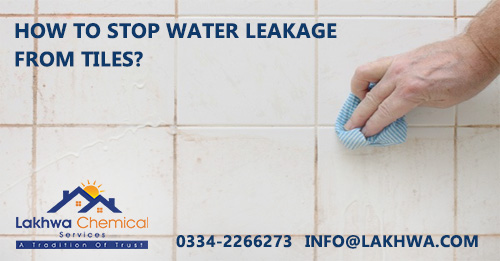How to Stop Water Leakage from Tiles?
Water leakage from tiles can be a frustrating and costly problem in homes and buildings. Whether it’s a bathroom, kitchen, or outdoor area, water infiltration through tiles can lead to structural damage, mold growth, and lower resale value. But, with the right approach, you can prevent and address the issue properly.
Let’s discuss the topic in more detail!
Inspection and Maintenance
Regular inspection and maintenance is necessary to prevent water leakage from tiles. Following are some key steps to comprehend:
-
Check for Cracks and Gaps
Examine the grout lines and the tiles for visible cracks, chips, or gaps. Water can seep through the openings and damage the underlying structure.
Read More
How Easy Is It To Apply Water Leakage Solutions in Karachi?
Benefits of Using Acrylic Based Waterproofing For Your Home
Tips to Perform Concrete Water Tank Leakage Solution in Pakistan
-
Reapply Sealant
Sealant is essential for protecting the grout and tiles from water penetration. If you notice that the binder is damaged or ruptured, reapply it!
-
Inspect Caulking
Where tiles meet other surfaces, such as bathtub edges or countertops, make sure that the caulking is intact. Replace any damaged caulking promptly.
Proper Installation
One of the most effective ways to prevent water leakage from tiles is to ensure proper installation from the start:
-
Hire a Professional
It’s essential to have your tiles installed by experienced professionals who understand the correct techniques and use appropriate materials.
-
Waterproofing Membrane
In wet areas like bathrooms and kitchens, consider using a waterproofing membrane beneath the tiles. This provides an additional layer of protection against water infiltration.
-
Use Quality Materials
Invest in high-quality tiles, grout, and sealant materials. Quality products are more durable and resistant to water damage.
Grout and Sealant
The grout and sealant play a crucial role in preventing water leakage. Here’s how to manage them effectively:
-
Choose the Right Grout
Opt for epoxy or urethane grout, which are more resistant to water penetration compared to traditional cement-based grout. These types of grout are also less likely to crack over time.
-
Apply Sealant Correctly
When applying sealant, make sure it covers the grout lines completely and is evenly distributed. Pay special attention to corners and edges where water is more likely to penetrate.
-
Reapply Sealant
Sealant deteriorates over time, so it’s essential to reapply it regularly, typically every one to two years or as recommended by the manufacturer.
Read More
How Difficult Is It to Apply Water Leakage Solutions for Roof?
Types of Methods Used for Water Tank Leakage Solution in Karachi
How Can a Waterproofing Membrane in Pakistan Help from a Leaky Water Tank?
Addressing Problem Areas
Sometimes, even with proper installation and maintenance, water leakage issues can still arise. In such cases, here’s how to address problem areas:
-
Identify the Source
To stop water leakage, you must identify the source. This may involve tile removal or a water test to pinpoint the exact location of the problem.
-
Repair or Replace Damaged Tiles
If tiles are damaged or cracked, they should be replaced immediately. Ensure that the new tiles are installed and sealed properly.
-
Re-Grouting Damaged Areas
Remove the damaged grout and reapply a high-quality grout. Make sure it is fully cured and sealed.
Professional Help
In some cases, water leakage issues may be beyond DIY methods. If you notice extensive damage or are unable to locate the leakage source, it’s advisable to seek professional assistance:
-
Consult a Tile Expert
A professional tile installer or contractor can assess the situation and provide expert guidance on how to address the issue.
-
Waterproofing Specialists
If you suspect a significant issue with water infiltration, such as a compromised waterproofing membrane, consult with waterproofing specialists who can perform thorough inspections and quick repairs.
Conclusion
Preventing and stopping water leakage from tiles requires a combination of proactive maintenance, proper installation, and timely repairs. Regular inspection, resealing, and addressing issues promptly can go a long way in preserving the integrity of your tiles and preventing costly water damage. If you’re unsure about the extent of the problem or lack the necessary skills, don’t hesitate to seek professional assistance to ensure your tiles remain watertight and in excellent condition. By following these guidelines, you can enjoy beautiful, leak-free tile surfaces in your home or building for years to come.
Contact Lakhwa Chemical Services for a fool-proof project.




Leave a Reply
Want to join the discussion?Feel free to contribute!